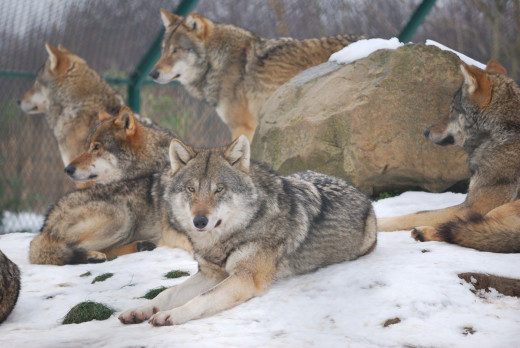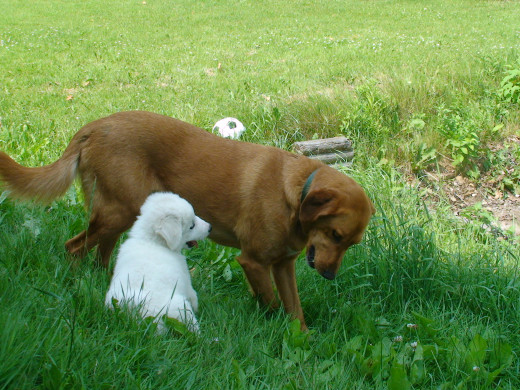Origin of Domestic Dogs




Dog breeds today encompass a large variety of size, temperaments and specialized features. Many of these features combine uniquely to create charming and interesting hybrids or mutts. It is still not set in stone when the first dogs were domesticated from the Eurasian gray wolf (Canis lupis lupis). If it can be determined when dogs were first domesticated, this information may shed some light on the reasons that dogs became the first domesticated animal. Early genetic research has suggested that east Asia was the first place the taming of the wolf occurred. However, as more evidence, genetic and archaeological. is discovered ,the picture of human domestication of the dog becomes clearer.
What researchers investigating Origins of the Dog are Saying
'The solution to the origin of the dog will come from sampling wolves throughout the world as well as village dogs.' (Dr. Robert Wayne, biologist at University of California)
'We may be able to turn dogs into a genetic marker for what human populations were doing.' (Adam Boyko of Cornell's Carlos D. Bustamante Lab)
'In shape, the Palaeolithic dogs most resemble the Siberian Husky, but in size, however, they were somewhat larger, probably comparable to large shepherd dogs.' (Mietje Germonpré, palaeontologist at the Royal Belgian Institute of Natural Sciences)
Origin of Dogs
Scientists have recently discovered what is believed to be the world's first known dog, Canis lupus domesticus. The remains were dated at 31,700 years ago and suggest that this dog survived on horse, musk ox and reindeer meat. Previously, the appearance of the domestic dog was thought to be only 14,000 years ago from Russian remains dated to that time.
The remains of this oldest prehistoric dog were excavated at Goyet Cave in Belgium. This locale suggest that the Aurignacian people of Europe from the Upper Paleolithic period were the tribe to first domesticate dogs. In the past, it was suggested that dogs originated in East Asia based on genetic information from a 2002 survey. Later studies on a wider range of village and breed dogs including African village dogs determined that East Asian and African dogs share the same degree of high genetic diversity. Since the origin of a species is usually the source of greatest genetic diversity, the locale where dogs were first domesticated is now under question. Since wolf populations are not known to have widely existed in Africa, it is thought that a place between east Asia and Africa, such as the Caucasus Mountains, may hold the key to the origin of dogs. Detailed investigation of the domesticated dog's family tree will help scientists not only track the origin of dogs but also will reveal important information about the early history of humans, including that of human migration and early trade routes.
"About 12,000 years ago hunter-gatherers in what is now Israel placed a body in a grave with its hand cradling a pup. Whether it was a dog or a wolf can't be known. Either way, the burial is among the earliest fossil evidence of the dog's domestication." (Lange, Karen E.)
Four Theories Proposing the Origin of Dogs
Human hunter-gatherers and wolves were both social species who shared habitat and hunted similar prey. There are four prevalent theories which are being investigated as having led to the domestication of the dog.
1. Orphaned wolf cubs:
- wolf cubs, it has been shown, can be tamed if taken at a very early age from their mothers
- it is theorized, that once these adopted dogs began breeding together, a tamer and more socialized wolf would have developed
- generations of breeding may have resulted in a more dog-like creature which was less aggressive and better at begging for food
2. The Promise of Food:
- dogs may have domesticated themselves by adapting to the new niche of human refuse dumps
- canids scavenging at these sites were less likely to flee from people, survived and became increasingly tame
- these dogs, it is thought, would see humans as part of their pack, and in protecting their range from predators, would be useful to the early humans as a means of preventing surprise attacks
- pariah dogs of India and the New Guinea "singing dogs" behave much like this now as scavengers depending upon human refuse for survival
- if the trait of tameness is heritable, then this separate population of 'camp' wolves would have become less fearful of humans over time and more likely to be domesticated
3. As a beast of burden:
- it is likely that the dog was the beast of burden before the domestication of the horse and ox
- North American Indians used dog-sized travois before bigger ones developed for use with horses suggesting that dogs were used to pull belongings
- Inuit peoples have long used dogs for pulling sleds
4. As a source of food and fur:
- wolf fur is a highly prized commodity still and Asian countries frequently consume dog meat
- it is possible that dogs were domesticated for easy access to a protein source and source of warm clothing
Changing Ideas of Where the Dog was Domesticated
Most recent evidence points to the Middle East as the area where dogs originated.
A recent study suggests that domestic dogs are most closely related genetically to Middle Eastern gray wolves than with any other wolf population in the world. Thus, the new theory that dogs originated in the Middle East is strongly supported by well researched genome-wide analysis. Regardless, even as new evidence emerges, it is impossible to deny that the dog evolved in the company of humans, unable to now exist without them. Even feral pariah dogs rely on the refuse of humans to survive and stay close to human settlements. Dogs and humans have an intimate relationship born of millenia of close contact. They have truly evolved as man's best friend.
Resources Used
Harmon, Katherine. Scientific American. The Origin of Dogs. August 20, 2009
Hunwick, John. West African and Sahara Studies. Origin of the Domestic Dog. March 22, 2009
Lange, Karen E. National Geographic Magazine. Wolf to Woof: The Evolution of Dogs. January 2002
Viegas, Jennifer. Discovery News. World's First Dog Lived 31,700 Years Ago, Ate Big. October 17, 2008
Wade, Nicholas. The New York Times. Research Undermines Dog Domestication Theory. August 4, 2009
Wolpert, Stuart. UCLA News. Dogs likely originated in the Middle East, new genetic data indicate. March 17, 2010










